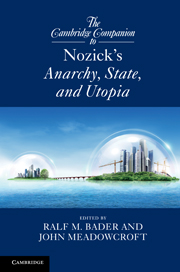10 - The framework for utopia
from Part IV - Utopia
Published online by Cambridge University Press: 28 September 2011
Summary
INTRODUCTION
Having argued in Parts I and II of Anarchy, State, and Utopia (ASU) that a minimal state is justified and that no state more extensive than the minimal state is legitimate, Nozick attempts to establish in Part III that the minimal state is an inspiring meta-utopia which we should strive to realize. Nozick's discussion of utopia and his argument to the effect that the minimal state is a framework for utopia is important for three overarching reasons. First, it constitutes a fascinating and underappreciated investigation into utopian theorizing. Second, it provides us with an account of the features that a Nozickian society is likely to exhibit, thereby enhancing our understanding of the positive vision underlying Nozick's project. Third, it is meant to constitute an independent argument for the minimal state that does not rely on any moral considerations, in particular an argument that does not rely on Nozick's controversial theory of individual rights (see p. 309 fn. and p. 333). The results of the different parts of ASU are meant to converge from different starting points on the same end point, namely a minimal state. This means that even if Nozick’s libertarianism should turn out to be lacking a solid moral foundation, as has frequently been raised as an objection, his argument that the minimal state is a meta-utopia would still have to be reckoned with, which means that it is not possible to circumvent Nozick’s defense of the minimal state by simply rejecting his theory of individual rights.
- Type
- Chapter
- Information
- The Cambridge Companion to Nozick's Anarchy, State, and Utopia , pp. 255 - 288Publisher: Cambridge University PressPrint publication year: 2011
- 2
- Cited by



